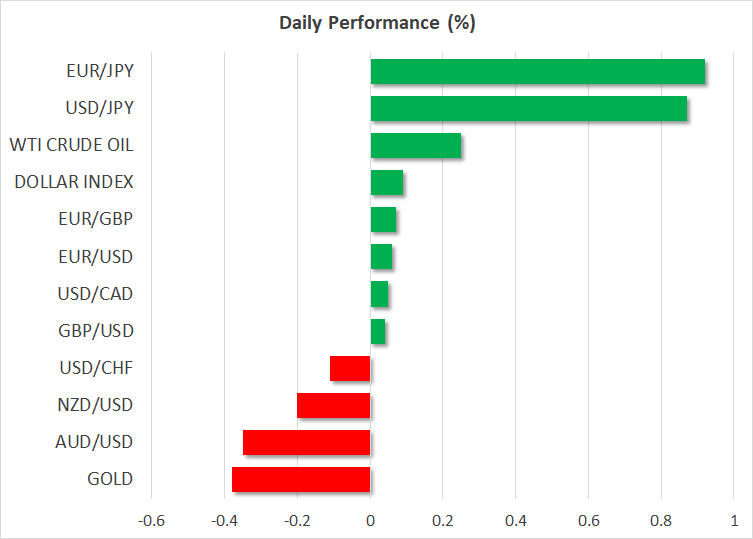- Dollar rallies as NFP beat estimates, unemployment rate slides
- Investors push back their Fed rate cut bets
- Focus now turns to US CPI data and Fed meeting
- Wall Street gains on soft-landing hopes, oil recovers

Better-than-expected US jobs data lift US dollar
The US dollar rose on Friday after the US employment report revealed that job growth in the US accelerated by more than expected in November and that the unemployment rate dropped, prompting market participants to push back their Fed rate cut expectations.
Expectations that the Fed could pivot to cutting interest rates as soon as the first quarter of 2024 were dented, with the probability of a 25bps cut being delivered in March dropping from around 60% to 45%. However, a reduction of the same size remains fully priced in for May, as with the Fed announcing its last policy decision for 2023 on Wednesday and the CPI numbers for November being released the day before, investors may have thought that pushing further back their bets was a premature choice. The total number of bps worth of cuts for next year was reduced to 110 from around 125.
Dollar/yen rebounds ahead of CPIs and Fed decision
Today, the dollar seems to be stabilizing, trading nearly unchanged from Friday’s close against all the other major currencies except the yen. The Japanese currency is probably extending its slide due to a Reuters report on Friday, citing three sources familiar with the BoJ’s thinking, that Governor Ueda’s latest remarks on policy-exit options were not intended to hint at a potential exit timing.
In the absence of any new BoJ related headlines, dollar/yen traders may now lock their gaze on the US inflation data and the Fed decision. Headline inflation is expected to have slowed somewhat, but the core rate is anticipated to have held steady at 4.0%, which is unlikely to alter much the market’s current implied path, especially just a day ahead of the Fed’s decision announcement.
As for the Fed, investors will be looking at whether the new dot plot will point to more rate reductions for 2024 than the previous one and whether Fed Chair Powell will keep the option of another hike on the table, or whether he will emphasize more the prospect and timing of a policy pivot.
The Fed is not the only major central bank that holds its last meeting for 2023 this week. The ECB, the BoE and the SNB will also announce their policy decisions on Thursday. The market expects the ECB to start cutting interest rates earlier than the Fed, but it doesn’t fully price in a quarter-point reduction by the BoE before August. As for the SNB, there is around a 20% chance for a cut to be announced on Thursday.
Wall Street gains on jobs data, oil recovers on US strategic purchases
After Friday’s stronger than expected US jobs data, Wall Street closed in the green, with the Nasdaq securing the most gains. It seems that the prospect of slightly fewer Fed rate cuts next year did not discourage equity investors from adding to their risk exposures. On the contrary, the better-than-expected employment report may have revived hopes of a soft landing for the US economy.
In the energy sphere, oil prices have been in a recovery mode since Thursday, extending their gains today. This may have been due to efforts from the US to replenish its strategic reserves, with the recent price weakness drawing US demand of up to 3mn barrels.
WTI is up more than 4% from its Thursday low, but it closed in the red for the seventh straight week on Friday, as oversupply and demand concerns continue to linger. At its latest meeting, the OPEC+ group announced deeper cuts for next year, but on a voluntary basis, which casts doubts on whether members will abide by the new quotas, while on Saturday, Chinese data showed rising deflationary pressures, evidence of weak demand from the world’s top oil importer.
